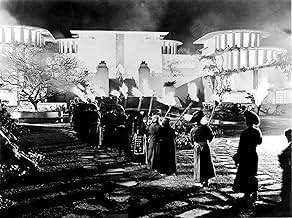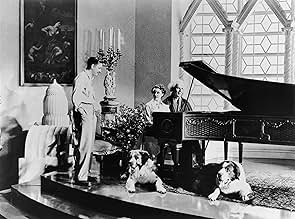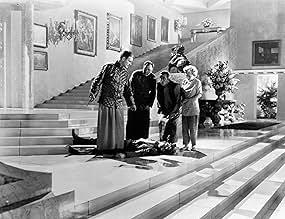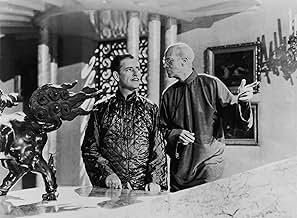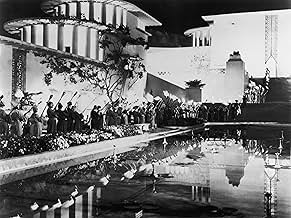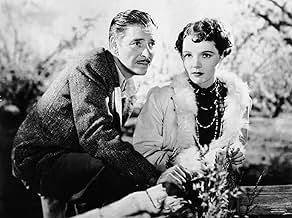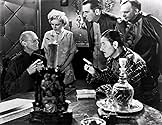VALUTAZIONE IMDb
7,6/10
15.212
LA TUA VALUTAZIONE
Aggiungi una trama nella tua linguaWhen a revered diplomat's plane is diverted and crashes in the peaks of Tibet, he and the other survivors are guided to an isolated monastery at Shangri-La, where they wrestle with the invit... Leggi tuttoWhen a revered diplomat's plane is diverted and crashes in the peaks of Tibet, he and the other survivors are guided to an isolated monastery at Shangri-La, where they wrestle with the invitation to stay.When a revered diplomat's plane is diverted and crashes in the peaks of Tibet, he and the other survivors are guided to an isolated monastery at Shangri-La, where they wrestle with the invitation to stay.
- Regia
- Sceneggiatura
- Star
- Vincitore di 2 Oscar
- 6 vittorie e 6 candidature totali
Norman Ainsley
- Embassy Club Steward
- (non citato nei titoli originali)
Chief John Big Tree
- Porter
- (non citato nei titoli originali)
Wyrley Birch
- Missionary
- (non citato nei titoli originali)
Beatrice Blinn
- Passenger
- (non citato nei titoli originali)
Hugh Buckler
- Lord Gainsford
- (non citato nei titoli originali)
Sonny Bupp
- Boy Being Carried to Plane
- (partecipazione non confermata)
- (non citato nei titoli originali)
John Burton
- Wynant
- (non citato nei titoli originali)
Tom Campbell
- Porter
- (non citato nei titoli originali)
Matthew Carlton
- Pottery Maker
- (non citato nei titoli originali)
Recensioni in evidenza
Along with A TALE OF TWO CITIES, THE PRISONER OF ZENDA, and THE LIGHT THAT FAILED, LOST HORIZON represented the best performance possible out of Ronald Colman. And his Robert Conway is the most modern of them (up to the time the films were made). LOST HORIZON is set (as James Hilton intended) in the 1930s, in war torn China. It is not the only reference in the story to the 1930s that Hilton puts into his fable of a paradise on earth.
Hilton had reason to fear about the world he lived in. The Great War (as the First World War was generally called in the 1930s) was still a savage and recent nightmare. The 1920s and 1930s saw dictatorships seize control of European and Asian state, and Democracy retreating everywhere. "Look at the world", says the High Lama (Sam Jaffe), "Is anything worse?" The High Lama is correct - the world is collapsing, and the so-called panaceas (Communist Russia, Nazi Germany, Fascist Italy and Spain, Imperial Japan and it's "Greater Asiatic Co-Prosperity Sphere") are worse than the seeming ineptitude and drift in badly divided France, weakened Britain, and recovering American.
Hilton took Conway, his brother George, Professor Edward Everett Horton, suspiciously quiet businessman Thomas Mitchell, and consumptive Isabel Elsom to an oasis (possibly the oasis) on that troubled old earth - Shangri La, or "the valley of the Blue Moon") where contentment and peace reigned and people could live, if not forever, far longer and more happily than in say 1937 Germany, Britain, France, Russia, Italy, the U.S., or Japan.
On the whole Capra catches the spirit of the novel - his sets were dismissed as being far to simplistic, but as simplicity is the hallmark of life at Shangri-La the critics seemed to miss the point. As a matter of fact, his sets (in a temperate valley in the Himalayas - a real impossibility) are more acceptable than the idiocies of the future world in the contemporary science fiction film THINGS TO COME, where H.G.Wells believes we should live in cities built in caves.
The acting is very good, particularly Sam Jaffe's ancient High Lama (always shot in shadows). Remember, he is over two hundred years old. Today, because Jaffe had a long career in Hollywood (despite being blacklisted in the 1950s), we think of him as an old man in THE ASPHALT JUNGLE or as "Dr. Zorba" in the series BEN CASEY. So we think he must have looked old in real life when LOST HORIZON was shot. Actually, he was in his thirties or forties, so he was not that old. But he gave a performance that suggested he was an old man.
Another member of the cast that I would wish to bring up for consideration is John Howard. He is not recalled by film fans too much, but Mr. Howard was a good, competent actor. That he played Hugh "Bulldog" Drummond in a series of "B" features in the late thirties makes it ironic that he played the younger brother of Ronald Colman here, who had begun the talking picture segment of his career with the same role. Howard does not have a British accent, but he does show the adoration of the younger brother for his famous sibling, and the growing anger and contempt he develops when brother Robert fails to plan for their leaving this prison they were dragged to - note how he wants to return with a bomber to destroy Shangri-La. It is one of the two roles in major films that John Howard is remembered for, the other being "George Kittridge", the erstwhile fiancé of Tracy Lord (Katherine Hepburn) in THE PHILADELPHIA STORY, who is pushed aside by both Cary Grant and James Stewart.
As it is one of Howard's best roles, it is nice that when the film was restored (as well as possible) in the 1980s, Howard (one of the three surviving cast members) was able to appreciate it - many of the missing sequences were his scenes. Howard was very happy at the restoration result.
Now, one or two notes that may help appreciate the film a little more. Who is Robert Conway supposed to be? He is called, by the High Lama, "Conway, the empire builder." He is supposedly able to do impossible things - hence the admiration of his brother. When he returns to Shangri-La at the end, the comment of the man telling the story is that Conway's journeys by himself back to his valley was beyond what ordinary men could do. So who is Conway? Well, in 1937, the model for Robert Conway was dead, from a motorcycle accident, for two years. It was, of course, Thomas Edward Lawrence "of Arabia", who had never been in Tibet (officially, anyway) but had served time in the Indian subcontinent area on government business in the 1920s. Quite a model for an empire builder.
The character played by Thomas Mitchell is also based on a real person. Harry Barnard's real name (which I have forgotten) is that of an international financier whose vast empire collapsed ruining thousands of investors. It turns out Mitchell's character is based on Samuel Insull, a mid western utilities empire builder (out of Chicago) whose financial doings brought about his collapse in the Great Depression. Insull fled in disguise to Greece, but was found on a dirty freighter, and returned to the U.S. (where he would stand trial for fraud, but be acquitted). Edward Everett Horton's anger at Mitchell when he learned the latter's identity is understandable. Mitchell's involvement in installing new pipes in Shangri-La mirrors Insull's early days, when he was an electrician, and an assistant to Thomas Edison.
The use of these two real figures as the basis of the characters helped contemporary audiences to accept the background of the plot of the film.
Hilton had reason to fear about the world he lived in. The Great War (as the First World War was generally called in the 1930s) was still a savage and recent nightmare. The 1920s and 1930s saw dictatorships seize control of European and Asian state, and Democracy retreating everywhere. "Look at the world", says the High Lama (Sam Jaffe), "Is anything worse?" The High Lama is correct - the world is collapsing, and the so-called panaceas (Communist Russia, Nazi Germany, Fascist Italy and Spain, Imperial Japan and it's "Greater Asiatic Co-Prosperity Sphere") are worse than the seeming ineptitude and drift in badly divided France, weakened Britain, and recovering American.
Hilton took Conway, his brother George, Professor Edward Everett Horton, suspiciously quiet businessman Thomas Mitchell, and consumptive Isabel Elsom to an oasis (possibly the oasis) on that troubled old earth - Shangri La, or "the valley of the Blue Moon") where contentment and peace reigned and people could live, if not forever, far longer and more happily than in say 1937 Germany, Britain, France, Russia, Italy, the U.S., or Japan.
On the whole Capra catches the spirit of the novel - his sets were dismissed as being far to simplistic, but as simplicity is the hallmark of life at Shangri-La the critics seemed to miss the point. As a matter of fact, his sets (in a temperate valley in the Himalayas - a real impossibility) are more acceptable than the idiocies of the future world in the contemporary science fiction film THINGS TO COME, where H.G.Wells believes we should live in cities built in caves.
The acting is very good, particularly Sam Jaffe's ancient High Lama (always shot in shadows). Remember, he is over two hundred years old. Today, because Jaffe had a long career in Hollywood (despite being blacklisted in the 1950s), we think of him as an old man in THE ASPHALT JUNGLE or as "Dr. Zorba" in the series BEN CASEY. So we think he must have looked old in real life when LOST HORIZON was shot. Actually, he was in his thirties or forties, so he was not that old. But he gave a performance that suggested he was an old man.
Another member of the cast that I would wish to bring up for consideration is John Howard. He is not recalled by film fans too much, but Mr. Howard was a good, competent actor. That he played Hugh "Bulldog" Drummond in a series of "B" features in the late thirties makes it ironic that he played the younger brother of Ronald Colman here, who had begun the talking picture segment of his career with the same role. Howard does not have a British accent, but he does show the adoration of the younger brother for his famous sibling, and the growing anger and contempt he develops when brother Robert fails to plan for their leaving this prison they were dragged to - note how he wants to return with a bomber to destroy Shangri-La. It is one of the two roles in major films that John Howard is remembered for, the other being "George Kittridge", the erstwhile fiancé of Tracy Lord (Katherine Hepburn) in THE PHILADELPHIA STORY, who is pushed aside by both Cary Grant and James Stewart.
As it is one of Howard's best roles, it is nice that when the film was restored (as well as possible) in the 1980s, Howard (one of the three surviving cast members) was able to appreciate it - many of the missing sequences were his scenes. Howard was very happy at the restoration result.
Now, one or two notes that may help appreciate the film a little more. Who is Robert Conway supposed to be? He is called, by the High Lama, "Conway, the empire builder." He is supposedly able to do impossible things - hence the admiration of his brother. When he returns to Shangri-La at the end, the comment of the man telling the story is that Conway's journeys by himself back to his valley was beyond what ordinary men could do. So who is Conway? Well, in 1937, the model for Robert Conway was dead, from a motorcycle accident, for two years. It was, of course, Thomas Edward Lawrence "of Arabia", who had never been in Tibet (officially, anyway) but had served time in the Indian subcontinent area on government business in the 1920s. Quite a model for an empire builder.
The character played by Thomas Mitchell is also based on a real person. Harry Barnard's real name (which I have forgotten) is that of an international financier whose vast empire collapsed ruining thousands of investors. It turns out Mitchell's character is based on Samuel Insull, a mid western utilities empire builder (out of Chicago) whose financial doings brought about his collapse in the Great Depression. Insull fled in disguise to Greece, but was found on a dirty freighter, and returned to the U.S. (where he would stand trial for fraud, but be acquitted). Edward Everett Horton's anger at Mitchell when he learned the latter's identity is understandable. Mitchell's involvement in installing new pipes in Shangri-La mirrors Insull's early days, when he was an electrician, and an assistant to Thomas Edison.
The use of these two real figures as the basis of the characters helped contemporary audiences to accept the background of the plot of the film.
There is an aura that seems to surround classic films made before the days of computer generated visual effects and intense marketing campaigns. It was a time when motion pictures depended on grand stories, superb performances, and great direction to catapult their success. This was exactly the case of `Lost Horizon,' a film from director Frank Copra (`It's A Wonderful Life'). With elaborate set designs, excellent performances by Ronald Colman, Jane Wyatt, John Howard, Thomas Mitchell, and Edward Everett Horton, `Lost Horizon' is a story of survival and ultimately finding a way home, that cannot be forgotten. `Lost Horizon' is a tale of five castaways who inadvertently find themselves in Shangri-La after their plane crashes in the mountains of Tibet. They are lead into the place of eternal youth, natural beauty, and free from strife by members of the region. They are treated as guests, and although they want to leave and find their way back to the world as they know it, porters are hard to find. It all leads to a notion that none of them want to admit; that they were meant to be in Shangri-La. Out of the thousands of movies that have been produced in the past 100 years, only a few afford of the privilege of remembrance. What's more, only a few seem to survive due to the nature of celluloid prints breaking down over time. A similar problem plagued `Lost Horizon,' in that after decades of worthy theatrical re-issues, the prints depreciated, with many withering away. As such, a preservation program was set in place to save copies of the film. Thanks to the works of countless individuals, this classic has been restored, to a certain degree, with some of the footage missing, replaced by still shots of the actors and recorded dialogue. From a critical standpoint, `Lost Horizon' has stood the test of time to be one of the greatest adventure classics ever produced by Hollywood. What is astonishing about this film is the attention to detail. As the film begins, a battle is taking place somewhere in China where we meet our protagonist, Bob Conway (Coleman). As the film continues, the scene changes to a scene on an airplane where our characters are trying to leave the war torn region. At one point, the crew is at a high altitude where the temperature is very cold. As such, we can see their breath in the shot as they speak. Normally, this kind of feature is ignored as the scene is short, but it adds a touch of realism that can't be denied. Incredible detail went into the creation of Shangri-La. With its large sets, beautiful costume design, the film takes on an epic proportion only rivaled by the grand designs of such Biblical epics as `Ben-Hur,' and `The Ten Commandments.' Truly, director Capra wanted to create an image that audiences would be astounded by
and he truly succeeded.
One can't help but admire the characters-they are all a bit naïve, but all intriguing in their own ways. Conway (Coleman) is a British diplomat and explorer whose fame is well deserved. His brother, George (Howard) presents a great deal of fear for the unknown Shangri-La. The characters of Henry Barnard (Mitchell) and Alexander P. Lovett (Horton) add a real sense of humor to the film. There are some minor inconsistencies in the story and various tasks that the characters try to pull off, but it's hardly worth complaining about because the film is such a treasure among other films. After 66 years, `Lost Horizon' remains far better than most of the adventure films that play in cinemas nowadays. One can only wish that they could have been present to see this in a theater during its original run. How amazing it would have been to see this epic tale of survival and the human struggle against itself back in 1937. `Lost Horizon' is indeed a remnant from the golden age of cinema. ***1/2
One can't help but admire the characters-they are all a bit naïve, but all intriguing in their own ways. Conway (Coleman) is a British diplomat and explorer whose fame is well deserved. His brother, George (Howard) presents a great deal of fear for the unknown Shangri-La. The characters of Henry Barnard (Mitchell) and Alexander P. Lovett (Horton) add a real sense of humor to the film. There are some minor inconsistencies in the story and various tasks that the characters try to pull off, but it's hardly worth complaining about because the film is such a treasure among other films. After 66 years, `Lost Horizon' remains far better than most of the adventure films that play in cinemas nowadays. One can only wish that they could have been present to see this in a theater during its original run. How amazing it would have been to see this epic tale of survival and the human struggle against itself back in 1937. `Lost Horizon' is indeed a remnant from the golden age of cinema. ***1/2
Frank Capra classic about a group of British citizens, led by diplomat Robert Conway (Ronald Colman), who flee a rebellion in China only to have their plane crash in the Himalayas. They are taken to Shangri-La, a magical place isolated in the mountains where people can leave behind the worries of civilization. They learn they will live for hundreds of years there but only if they never leave. The world-weary Conway is intrigued by the promise of this utopia but not everyone in his group feels the same way.
It's an ambitious undertaking for Capra, who made no other movies on the scale of this one (or with the budget). The costumes and Art Deco sets are beautiful. Great script from Robert Riskin, adapted from James Hilton's novel. Lovely, haunting score from Dimitri Tiomkin. Ronald Colman, an exceptional actor who never did a bad job that I've seen, gives a moving, sincere performance that ranks among the best of his impressive career. Sam Jaffe is also excellent in his small but important role as the High Lama. The rest of the wonderful cast includes John Howard, Jane Wyatt, Edward Everett Horton, H.B. Warner, Isabel Jewell, and Thomas Mitchell (the first of four movies he did with Capra). Jane Wyatt's swimming scene is probably the sexiest thing she ever did on film. The opening scenes are exciting and the climax is powerful. The middle of the film is where many people complain that it's slow or that it loses focus. I admit there is a chunk of the middle of the film, dealing with Colman and Wyatt falling in love, as well as everyone adjusting (or not adjusting) to Shangri-La that drags just a bit. But I never felt bored and I don't think it derails the film at all. The dialogue and performances in these scenes is still great. The original cut ran much longer and I can only imagine whether that version would be better or worse. As it is, seven minutes of footage is still missing from the current version. The dialogue for these scenes is intact, with production stills in place of the missing footage.
It's escapism, pure and simple. Many viewers will poke holes in the idea and philosophy behind Shangri-La, calling it naive and childish. Perhaps they're right; perhaps the cold, cynical reality of selfish human nature means such a utopia is impossible. But the thing about most of Frank Capra's films, and why he is probably my favorite director ever, was that he believed in telling uplifting, optimistic stories about us helping each other overcome our baser nature; that good can triumph over evil and there are such things as happy endings. While Lost Horizon is not really one of his "Capra-corn" movies, I think the basic Capra elements are still there, right down to the final shot. Most other directors would have likely gone for the sad or tragic ending, but Capra gives us one that is hopeful.
It's an ambitious undertaking for Capra, who made no other movies on the scale of this one (or with the budget). The costumes and Art Deco sets are beautiful. Great script from Robert Riskin, adapted from James Hilton's novel. Lovely, haunting score from Dimitri Tiomkin. Ronald Colman, an exceptional actor who never did a bad job that I've seen, gives a moving, sincere performance that ranks among the best of his impressive career. Sam Jaffe is also excellent in his small but important role as the High Lama. The rest of the wonderful cast includes John Howard, Jane Wyatt, Edward Everett Horton, H.B. Warner, Isabel Jewell, and Thomas Mitchell (the first of four movies he did with Capra). Jane Wyatt's swimming scene is probably the sexiest thing she ever did on film. The opening scenes are exciting and the climax is powerful. The middle of the film is where many people complain that it's slow or that it loses focus. I admit there is a chunk of the middle of the film, dealing with Colman and Wyatt falling in love, as well as everyone adjusting (or not adjusting) to Shangri-La that drags just a bit. But I never felt bored and I don't think it derails the film at all. The dialogue and performances in these scenes is still great. The original cut ran much longer and I can only imagine whether that version would be better or worse. As it is, seven minutes of footage is still missing from the current version. The dialogue for these scenes is intact, with production stills in place of the missing footage.
It's escapism, pure and simple. Many viewers will poke holes in the idea and philosophy behind Shangri-La, calling it naive and childish. Perhaps they're right; perhaps the cold, cynical reality of selfish human nature means such a utopia is impossible. But the thing about most of Frank Capra's films, and why he is probably my favorite director ever, was that he believed in telling uplifting, optimistic stories about us helping each other overcome our baser nature; that good can triumph over evil and there are such things as happy endings. While Lost Horizon is not really one of his "Capra-corn" movies, I think the basic Capra elements are still there, right down to the final shot. Most other directors would have likely gone for the sad or tragic ending, but Capra gives us one that is hopeful.
I think I was about seven or eight years old when I first saw this film, and has always lingered in the back of my mind. This is pure movie magic of a rare kind, and it is surprising how well it holds up today. The story is handled with just the right balance of seriousness and humour, with fine performances throughout, and the timeless message it sends is truly profound. The middle part may be lacking a bit in pacing, but it is a minor quibble, since this, for my money, is a masterpiece. And it still looks great, with impressive set design and an abundance of atmosphere. The finale is simply sublime, and stays in the mind for a long time afterwards, one of my favorite movie moments of all time. A movie everyone should see.
I watched this film for the first time as a 10 year old and its effects on my willingness to be a optimistic idealist have always been led by my memories of this hope inspiring tribute to the need for the human being to find Heaven in this life. Perhaps Lost Horizon could have been that spark that enabled me to find just that. Like all films from another era do not judge this film for its apparent imperfections, rather for what it offered the audiences of that time (1937), hope that all would be well when man would recognize that his time is always better spent broadening his horizons of understanding. Frank Capra's guides his audiences through danger and turmoil to that place which dreams are made of, when we all make the effort to make it happen.
Lo sapevi?
- QuizThe year after this film was released the owner of a prosperous theater chain hired an architect who designed a mansion that was inspired by the Shangri-La lamasery in this film. Located in Denver, Colorado, it still exists today.
- BlooperEchoing the words of the critic, James Agate: 'The best film I've seen for ages, but will somebody please tell me how they got the grand piano along a footpath on which only one person can walk at a time with rope and pickaxe and with a sheer drop of three thousand feet or so?'
- Curiosità sui creditiBob Gitt of the UCLA Film & Television Archives claims the original opening sequence in 1937 had title cards "Conway has been sent to evacuate ninety white people before they're butchered in a local revolution" was changed in 1942 for a special reissue during WWII. The title cards read "before innocent Chinese people were butchered by Japanese hordes." This was to bolster propaganda against the Japanese.
- Versioni alternativeSome of the music in the restored version is dubbed into different sections than the ones in the 118 minute cut version. For example, the moment in which Robert Conway ('Ronald Colman') discovers that the High Lama is really Father Perrault i accompanied by soft music in the cut version, while in the restored version this moment is played with no music.
- ConnessioniEdited from Tempeste sul Monte Bianco (1930)
- Colonne sonoreWiegenlied (Lullaby) Op. 49 No. 4
(1868) (uncredited)
Composed by Johannes Brahms
English translator unknown
Sung a cappella by children at Shangri-La
I più visti
Accedi per valutare e creare un elenco di titoli salvati per ottenere consigli personalizzati
Dettagli
Botteghino
- Budget
- 4.000.000 USD (previsto)
- Tempo di esecuzione2 ore 12 minuti
- Colore
- Proporzioni
- 1.37 : 1
Contribuisci a questa pagina
Suggerisci una modifica o aggiungi i contenuti mancanti



